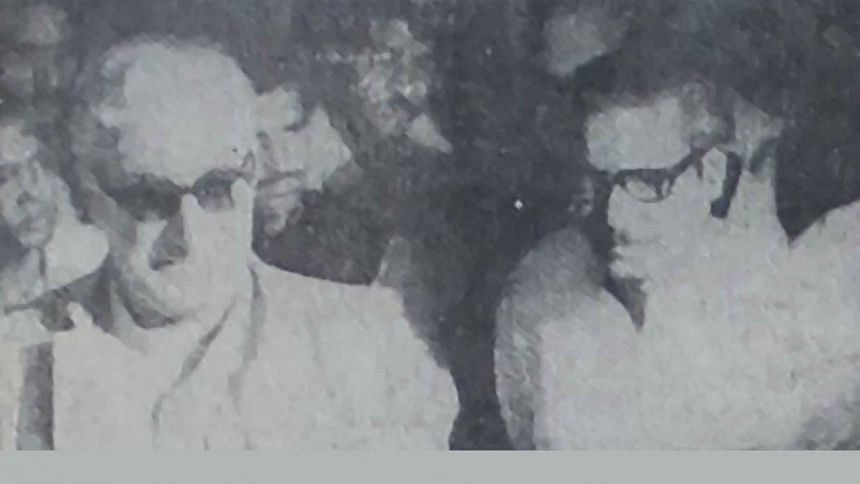Bhutto suggests power share

March 14, 1971
BHUTTO'S DEMAND FOR TRANSFER OF POWER
Zulfikar Ali Bhutto, chairman of the Pakistan People's Party, said today at a public meeting in Karachi that if power was to be transferred to the people before any constitutional settlement, as demanded by Bangabandu, it should be transferred to the Awami League in the East and the PPP in the West. He was quoted as saying "Idhar hum, Udhar tum' (we here, you there).
He added that the rule of the majority for the whole country would become applicable only if the Six-Point demand was dropped. Since that is not being done, the rationale and logic of this Six-Point demand necessitates agreement of the majority parties of both the wings, said Bhutto.
Bhutto further said that his party had not adopted an uncomprising attitude on the Six-Point demand. His party was trying its best to narrow down the differences on each and every point. The only debatable point was foreign trade and foreign aid.
He added that in the event of acceptance of Six-Point demand, Punjab and Sindh would have to meet about 80 percent revenues of the country. Besides, the Awami League maintained that the West Wing owed Rs 3,100 crore to the East Wing and about Rs 3,871 crore out of 4,000 crore rupees of foreign aid should go to the East Pakistan, said Bhutto.
He dismissed outright the Awami League's allegation that the date of National Assembly's Session was set by President General Yahya Khan after consulting him. He swore by 'Kalima' and his children, that President Yahya Khan did not consult him about the convening of the National Assembly Session.
On the same day Bhutto met Yahya in Karachi. Commenting on the incident, Bhutto wrote in his book The Great Tragedy he told Yahya that Mujib's demands for a transfer of power and the lifting of martial law were acceptable to his party but the modalities of these had to be worked out on the basis of an agreement.
Did Bhutto actually want the repeal of martial law? In hindsight, it is clear that he didn't as that would weaken his main ally, the Pakistan military. [ Srinath Raghavan, 1971: A Global History of the Creation of Bangladesh, Permanent Black, 2013, pp.46-47]
MUJIB'S NEW DIRECTIVES
Bangabandhu in his new directive issued on March 14, 1971, called upon people to continue the non-cooperation movement. He further said that the people had shown how to resist the conspiracy of the oppressors.
Referring to the new marital law order, Bangabandhu said that the people would continue with their struggle despite such attempts of intimidation as they know that no force can withstand the strength of the united people. His statement fell short of saying that defence installation employees should not report to work.
Bangabandhu issued 35-point directives on the future course of the non-cooperation movement. He suspended collection of income taxes by the central government and barred remittance of customs and excise duties and sales taxes, which were normally sent to the central government.
KISSINGER'S ASSESMENT
Henry Kissinger, the US president's assistant for National Security Affairs, wrote in his memorandum (dated March 13, 1971) to President Nixon: "It is not necessary for us to shift now to a more activist approach since Yahya knows we favor unity and is doing everything possible to achieve a political settlement."
Referring to Yahya's upcoming visit to East Pakistan, Kissinger suggested three possible outcomes: 1) Yahya could decide not to take [Sheikh Mujibur] Rahman's challenge lying down and to retaliate, perhaps to the extent of arresting Rahman and the other leaders, and attempting to clamp a military lid on East Pakistan. 2) A static waiting game could develop with neither the army nor the civilians prepared to take a bold initiative to break the deadlock and each hoping the other will break first, and 3) There might be more tactical political moves by Yahya, Rahman or Bhutto designed to probe for areas of accommodation and buy more time without giving up anything.
Shamsuddoza Sajen is a journalist and researcher. He can be contacted at [email protected]

 For all latest news, follow The Daily Star's Google News channel.
For all latest news, follow The Daily Star's Google News channel. 



Comments